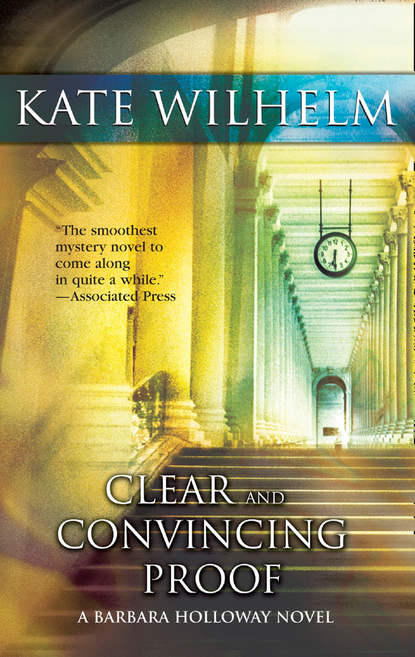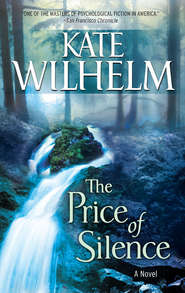По всем вопросам обращайтесь на: info@litportal.ru
(©) 2003-2024.
✖
Clear And Convincing Proof
Автор
Год написания книги
2019
Настройки чтения
Размер шрифта
Высота строк
Поля
That evening Naomi, Greg and Thomas sat in the living room of the residence and talked.
“It’s been a madhouse all day,” Greg said, handing Thomas a glass of claret. “They didn’t even remove the body until four this afternoon. And they’ll be back tomorrow with more questions.”
Thomas nodded. And the next day and the next, he thought, right up until they made an arrest, probably. “Tell me about it,” he said. His wrinkled face became so creased when he frowned that he looked inhuman, and he was frowning ferociously.
“McIvey came by this morning to make sure Naomi could drive him to the office,” Greg said, “and to get the key to the gate. He was going to sign a patient out. Annie dropped him off at seven-thirty, then left to go up to Portland to collect some X rays. Someone was waiting for him, or followed him, or he surprised someone who was already in the garden for God knows what reason. Anyway, he was shot in the heart at close range. The police kept asking exactly what time he arrived, what time he left, and I told them seven-thirty, then they wanted to know how I could be certain. God, you answer a question and they start pounding on the answer. The police wanted to know about the keys, who has one, when we lock up, when we open up. God knows how many keys are floating around. I don’t. You have one, we do, Carlos. Joyce had one. Who else? I don’t know.”
“Darren has one,” Naomi said. “He told them he doesn’t know where it is, but he did have one.”
Greg nodded, then said, “So he left the house here, sometime around seven-thirty. That’s about all I know directly.” He shook his head and went on, “The rest is what they call hearsay. You wouldn’t believe the rumors that have made the rounds today.”
“I probably would,” Thomas said. “Let’s have them.”
“Right. A patient says she heard what might have been a shot. She was in a wheelchair near her window waiting for breakfast, and she looked out and saw a dwarf in a shiny black cape and hood.”
“So are the police looking for a dwarf?” Thomas asked with a touch of sarcasm.
“Who knows what they think, what they’re looking for? Carlos found the body sometime after eight. He doesn’t know exactly what time it was. And Carlos said McIvey had been dragged off the main path out of sight. The police haven’t confirmed it, but if Carlos said so, I believe it. He’d notice something like that.”
“A powerful dwarf,” Thomas said. “Go on. What else?”
“Darren said he passed the open gate and saw an umbrella blowing around in the wind. He left his bike and walked in, closed the umbrella and leaned it against the building out of the rain. He didn’t see anyone and didn’t see the body. He thought the umbrella was mine.” He drew in a breath. “It was McIvey’s. Anyway, Darren got here before eight, but he doesn’t know how much before. Who pays attention like that?”
He got up to pour more wine. Thomas shook his head when Greg started to refill his glass. He never drank more than one glass of wine when he had to drive. He knew that at his age, if he was involved in any infraction of the law while he was driving, he might lose his license. He took no chances.
Naomi leaned forward in her chair and said indignantly, “The police searched the entire clinic and garden. They had someone in the pond, had blocked off the alley to search there, and even here, the residence and garden. I don’t even know what else. They’re looking for a gun, or for a shiny black cape or something. They intercepted Annie when she got to the hospital in Portland. An officer stayed with her when she picked up the X rays, and then drove her back to Eugene. They didn’t tell her anything, just that there had been an accident. What a nightmare that trip home must have been for her! And they got her to open the trunk of her car and the glove box for them to have a look inside.” Naomi’s voice was tight with anger.
“Where is she now?” Thomas asked.
“Upstairs in the guest room resting. She can’t stay alone in that condominium tonight. I took her over to get a few things. A detective went with us and put tape on the doors, sealed them.” She ran her hand through her hair, a gesture she used when upset. By now her hair looked like a straw bale that had come loose from a binding wire, standing out in all directions. “They acted as if they suspect her!”
Thomas waved that away. “Well, they do. They always suspect the surviving spouse in a homicide. But, Greg, Naomi, if they decide she couldn’t have moved him, if indeed he was moved, you know they’ll suspect both of you, me maybe. We all will benefit from this untimely death, I’m afraid. Not as much as the widow, certainly, but enough. And we have to decide how much to tell them of the hassle we’ve been going through. I hope the subject hasn’t already been raised.”
Greg snorted with derision. “They asked the group first, then when they questioned us separately. ‘Do you know of any enemies he had, anyone who might have wanted to harm him?’ Not a soul in that lounge stirred, except maybe to shake their heads. Nope, we don’t know anything like that.”
Thomas regarded Greg for a moment, then he said, “I suggest we keep it that way. If they want to know about the only board meeting David attended, I believe Annie can provide the tape for them to listen to. I explained their duties to the three new shareholders—David, Annie and you—and then I proposed that we consider creating a foundation. We adjourned without further discussion.” His gaze was unwavering. “Is that your recollection of our meeting, Greg?”
The tape would not reveal the flush of rage that had colored David’s face, or his tight-lipped silence, his curt nod…. “That’s how it was,” Greg said.
In the upstairs guest room Annie lay on the bed staring dry-eyed at the ceiling, remembering how happy she had been living in this room, in this house years before. How safe she had felt. She could not recapture any of those feelings; the girl she had been was out of reach, so distant she seemed dreamlike.
Tomorrow she would have to go home, she thought dismally. The detective who questioned her had said that it was part of the routine to look over the victim’s papers, check his computer; he might have received a threatening letter, something of that sort, without mentioning it for fear of alarming her. With near panic she thought of her diary, several diaries by now. She would have to put them away before the police saw them. But she wouldn’t have to face the police alone. Her mother would come to stay with her for a while, she had said on the phone, help her through this terrible time. She would be there by ten; by then Annie and the detectives would be there.
She was glad that her mother was coming. They would go out for lunch or for dinner. They might eat at six or not until nine. They could go shopping together and pay no attention to the clock. She would never keep a real schedule again as long as she lived.
She was free, Annie thought in wonder. Her servitude had ended.
Erica drove straight to the clinic from school that afternoon. She was stopped at the entrance to the staff parking lot, where a uniformed officer asked for ID, checked her against a list, then called someone on a cell phone. The lot was full of police cars, the alley blocked off with crime tape, and some television vans parked as close as they could get. The officer waved her on.
Inside the entrance to the clinic she was stopped again, this time by a plainclothes detective.
“Ms. Castle? I’m Detective Mike Clarkson. I’d like to ask you a few questions,” he said.
“It’s true, then?” she said. “Someone shot Dr. McIvey? I heard it on the news on the car radio.”
“It’s true,” he said. “We’re using this office.” He escorted her to Naomi’s office.
“Why me?”
He was middle-aged and polite, but straightforward to a fault. He didn’t wait for her to sit down before he started. “We’re asking everyone who was in the clinic between seven-thirty and eight this morning. That’s not your usual routine, I understand. Why were you here?” He flipped open a notebook.
Вы ознакомились с фрагментом книги.
Приобретайте полный текст книги у нашего партнера:
Приобретайте полный текст книги у нашего партнера:






